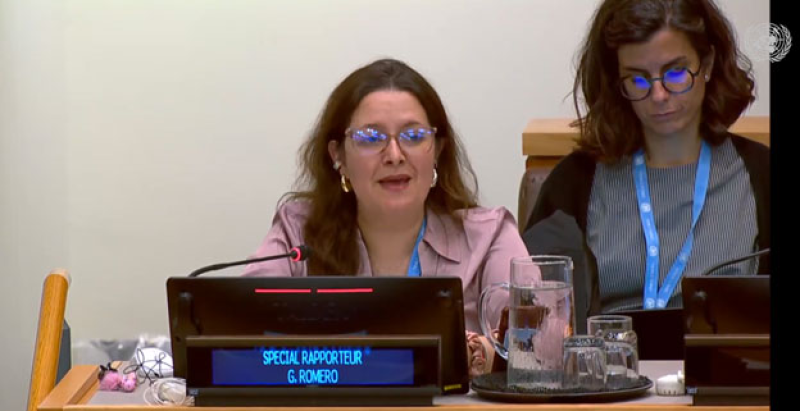- অতিথি পাখির বিচরণ আর দুষ্টুমিতে নান্দনিক হয়ে উঠেছে কুয়াকাটার চর বিজয় |
- Remittance inflow exceeds $632 million in first six days of Dec |
- 18 migrants die as inflatable boat sinks south of Greek island of Crete |
- TIB for polls manifesto vows to curb misuse of powers and religion |
- Khaleda now not fit for travelling: Medical Board |
Aid Cuts Threaten Civil Society and Global Rights

Credit: UN Web TV
The collapse of aid architecture is one of the greatest threats to civic space. This shift is not accidental but systemic, reflecting deliberate policy choices—not only by the US but accelerated by its decisions—that prioritize security agendas over human rights and solidarity.
Aid cuts, securitization, and geopolitical rivalries have led to the defunding of grassroots organizations, especially those led by women, LGBTQI groups, and marginalized communities. As a result, associations that once filled critical gaps are disappearing. These dynamics are existential, because without resources, protections, and solidarity, civil society cannot survive—let alone flourish.
This is the focus of a recent report, to be presented at the UN General Assembly on October 16.
Civil society’s weakening has direct consequences for human rights protection and democratic participation. Without independent associations, accountability mechanisms collapse and corruption flourishes. Marginalized groups are disproportionately affected, as grassroots organizations are often their only safety net. The dismantling of solidarity also jeopardizes progress toward the Sustainable Development Goals (SDGs).
For example, women’s organizations that once advanced gender equality and access to reproductive health are closing. LGBTQI associations providing health services face funding cuts. Environmental defenders, crucial in climate justice, are left exposed.
The report warns that the rollback of aid and civic freedoms undermines democracy and global commitments to equality and sustainability. It calls for urgent action to rebuild international solidarity and redesign aid in ways that strengthen rather than weaken civic space.
Key recommendations include:
Guaranteeing equitable access to resources: Direct, fair access to funding for highly vulnerable groups, with simplified procedures and minimal intermediaries.
Repealing restrictive laws and counter-terrorism measures: End misuse of security frameworks and repeal laws that stigmatize NGOs or limit operations.
Ensuring meaningful participation of civil society: Include associations as equal partners in multilateral decision-making and SDG implementation.
Aligning aid with human rights and civic protection: Condition aid on obligations to protect freedoms and provide long-term, flexible funding.
Protecting digital freedoms: Prevent misuse of technologies for surveillance and repression while safeguarding online association and assembly.
Reimagining solidarity: Shift from charity-based support to global justice and shared responsibility; supporting civil society is a legal and moral obligation under international human rights law.

